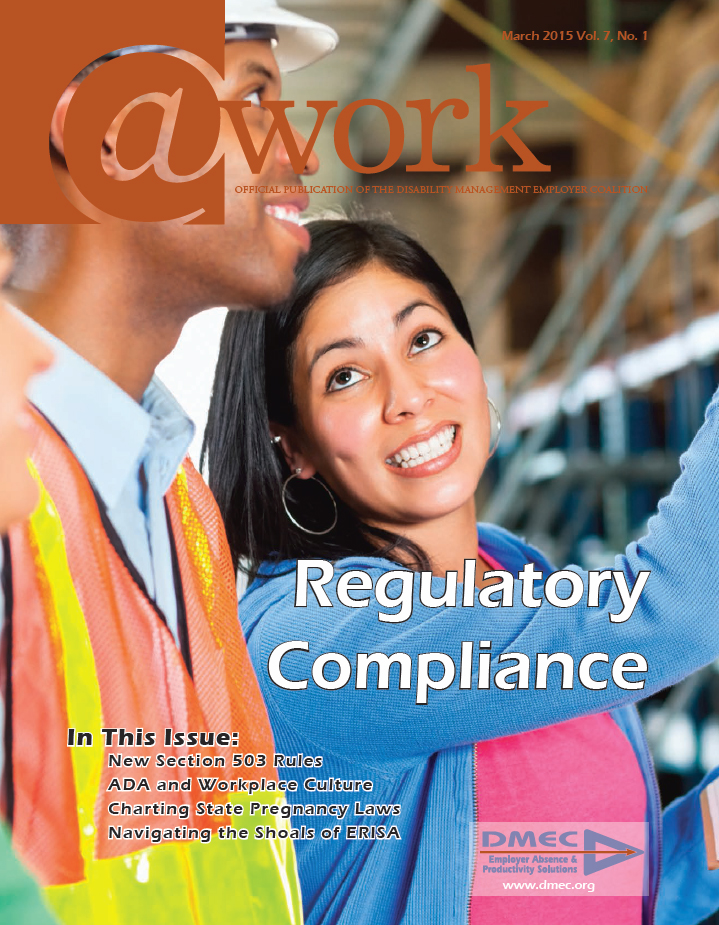Let’s face it. Managing employee leave isn’t the most glamorous aspect of HR or workforce management. But it’s certainly among the most challenging. The legal and regulatory backdrop to leave management is complex, and it varies based on factors that range from where you do business to the size of your company. You feel as if the rules are ever-changing. It’s like doing business in an amusement park fun house; it’s a challenge to keep your footing, hard to know if what you’re seeing is real, and difficult to get a firm hold on the rail to help lead you through the maze.
Are You Keeping Pace with Developments in Leave Management?

The Beat Goes On: Healthcare Debate Reignites Complexities of ADA Accommodation Compliance

It’s been over a quarter-century since President George H.W. Bush signed the Americans with Disabilities Act (ADA) into law, and more than eight years have passed since the act was amended to give employers and business owners greater clarity and guidance into the civil rights protections the ADA set in place.
Celebrating the 25th Anniversary of the ADA
This month marks the 25th anniversary of the ADA. President George H.W. Bush signed the ADA into law on July 26, 1990. As you probably know, Title I of the ADA requires employers to provide reasonable accommodation to qualified individuals (unless it would cause an undue hardship.) A few examples of these include a modified work station or schedule, acquisition or modification of devices, leave of absence or leave extension, etc.
We've provided a few resources below to help HR teams in managing employee accommodations.
A Nuts-and-Bolts Guide to the ADA Interactive Process
If you’ve ever been confused or concerned about the complex requirements of the [American with Disabilities Act (ADA)](http://www.ada.gov/ada_intro.htm) and its supplement, the [ADA Amendments Act (ADAAA)](http://www.eeoc.gov/laws/regulations/adaaa_fact_sheet.cfm), you’re not alone.
To ensure that every qualifying employee receives effective and reasonable accommodations under the law, you need to implement and follow an interactive process.
Best Practices in Centralizing Your Employee Accommodation Process
*This week’s blog post is brought to you by Optis' Executive Vice President, [Rene Gates](https://www.linkedin.com/pub/rene-gates/6/a03/6b9), and previously appeared in the March issue of [DMEC’s @Work magazine.](http://dmec.org/work-magazine/current-issue-archives/)*

Section 503 of the Rehabilitation Act of 1973 mandates that federal contractors do not discriminate against individuals with disabilities and that they make a concerted effort to hire these individuals.
In addition to this clause, the regulations contain specific d
FMLA, EEOC, and the Vowel Song
*This week’s blog post is brought to you by [Jim Bryant](https://www.linkedin.com/pub/jim-bryant/8/454/893) and the letter Y.*

I wonder if the farmer Old MacDonald would have a problem spelling FMLA and ADAAA? Would Mr.
7 Steps to Keep in Mind When Managing Employee Accommodations
Check out our latest [video](https://voice.adobe.com/a/Wrv3d) for seven quick tips on managing employee accommodations under the ADA/ADAAA.
7 Steps to ADA Accommodations Compliance
Although it’s been nearly four years since the EEOC issued long-awaited final regulations interpreting the ADA Amendments Act of 2008, compliance remains a huge challenge, and the risks of noncompliance can be costly. Keeping up with changes to — and interpretations of — the ADA/ADAAA can be a full-time job.
5 Best Practices to Keep in Mind When Managing Employee Accommodations
Last week, Optis attended [DMEC’s FMLA/ADAAA Employer Compliance Conference](http://dmec.org/compliance-conference/). After hearing several sessions regarding the ever-changing employment law landscape and compliance challenges, we thought it’d be beneficial to recap the best practices in managing ADA/ADAAA employee accommodations:
1. *Always engage in the interactive process*
Have open and transparent communication with your employees if they bring up a medical condition.
Five Reasons to Attend DMEC’s FMLA/ADAAA Employer Compliance Conference
This month, we’ll be heading to [DMEC’s FMLA/ADAAA Employer Compliance Conference]( http://dmec.org/compliance-conference/) in Washington, DC. This is one of our favorite conferences of the year, and we’re looking forward to connecting with absence and disability management professionals and discussing the complex challenges they face today.
The conference is taking place April 20 – 22, and registration is still open. Here are five reasons to attend:
1.

